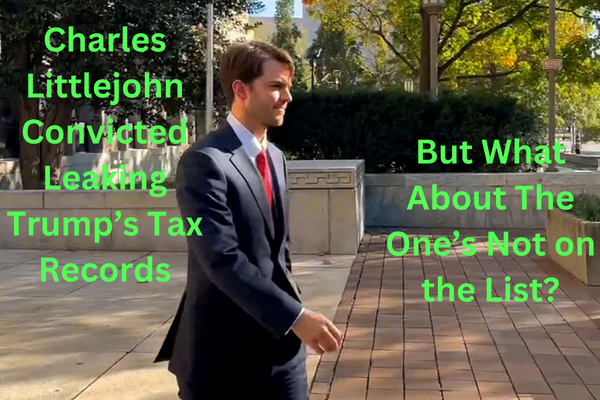
Introduction
Five years in prison have been imposed on Charles Littlejohn, the person who stole and leaked former President Donald Trump’s tax records. Littlejohn, a former contractor for the Internal Revenue Service (IRS), entered a guilty plea to making unauthorized leaks of income tax returns, setting the stage for this historic case. Judge Ana Reyes made forceful statements during the sentencing, highlighting the seriousness of the offense and drawing comparisons to an attack on the US Constitutional Democracy. Littlejohn’s information leak has continued to have an impact even while he deals with the fallout from his activities.
Contents on the Leaked Records List
The scope of Charles Littlejohn’s unlawful revelations went much beyond the pages of Donald Trump’s tax returns. The 15-year tax returns of thousands of affluent Americans were included in the hacked data. Prosecutors argued that Littlejohn’s goal was to draw attention to himself by making sensational admissions, rather than just revealing financial information.
This long-lasting effect became apparent when other press stories based on the stolen material kept coming out. The seriousness of the behavior was highlighted by the court’s sentence, which made it quite evident that such acts are neither appropriate nor justified.
The disclosure by Florida Senator Rick Scott—who was one of the victims of Charles Littlejohn’s information leak—was an unexpected turn of events. Strongly objecting to what he called the “plea deal of the century,” Scott voiced worries about the long-term effects on his family.
The judge analyzed the Justice Department’s decision to file a single count against Littlejohn, which created complexity in the court processes. The bench questioned the sufficiency of a single felony count in light of Littlejohn’s extensive theft and leakage, which led to criticism of this decision.
The Seriousness of the Crime
Judge Ana Reyes highlighted the significance of Littlejohn’s acts, describing them as an attack on the country’s legal system and democratic values. She drew comparisons to the Capitol attack of January 6, 2021, emphasizing the terror that such offenses inspire.
Littlejohn’s deliberate stealing, careful removal of digital evidence, and manipulation of system weaknesses indicated a purposeful attempt to get and distribute private tax information. The court used an opposing perspective to highlight how Littlejohn’s activities were seen as a threat to the nation’s justice system and democratic integrity.
Criticism of the Justice Department's Decision
Criticism of the Justice Department’s Decision: The Justice Department’s choice to file a single count of charges against Littlejohn was questioned in light of the seriousness of the crime. Judge Reyes highlighted the seriousness of Littlejohn’s widespread thefts and disclosures, expressing doubts about the sufficiency of a sole criminal offense.
In challenging this strategy, the judge highlighted the overall effect of Littlejohn’s acts, which the prosecution claimed were intended to sway an election and mold the country’s larger political narrative. The criticism highlighted the case’s complexity as well as the continuous discussion about the proper legal reaction to such extreme misbehavior.
Court's Sentencing and Public Impact
The court imposed the maximum sentence of five years in prison, three years of supervised release, and a $5,000 fine, noting the serious consequences of Littlejohn’s acts. Judge Reyes highlighted the need to prevent similar behavior in the future and restated the court’s duty as an uncompromising defender of American democracy.
The prosecution highlighted that the consequences of Littlejohn’s disclosure went beyond Trump’s tax returns, impacting many of the richest people in the country. The goal of the sentence judgment was to make a clear statement about the seriousness of the act and its broader consequences.
A Personal Justification
Littlejohn offered a personal justification for his actions, asserting a sincere but misguided belief that he was serving the country’s best interests. He argued that individuals had a right to access tax information for the sake of informed decision-making.
While expressing awareness of the potential consequences of his actions, he acknowledged that his deeds undermined the fragile faith citizens place in U.S. government institutions. Littlejohn’s defense sought to portray his motivations as rooted in a commitment to transparency, even as the court grappled with the gravity of the breach of trust and legal boundaries.
Conclusion
This uncompromising approach aimed to discourage future breaches of sensitive information in addition to holding Littlejohn accountable for his crimes. The sentencing highlighted the need for strict penalties in the face of attacks on the country’s constitutional democracy and reinforced the court’s commitment to upholding the integrity of legal foundations and the principles of democracy.
You may also read:
The Truth Behind Trump’s Defamation Scandal: Pay $83.3 To E.Jean Carroll
